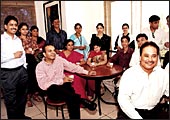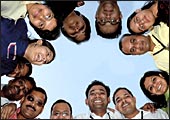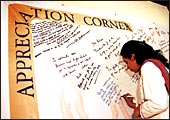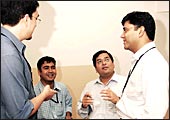 |
| Keep it simple: The philosophy has come
in extremely handy for Prasad (sitting, extreme right) |
G.V.
Prasad's spartan corner room at Dr Reddy's headquarters in Hyderabad
sports a new motivational sticker: In keeping with its message,
it just says "Simplify". For about a year now, Prasad
has used that word as a mantra to steer his pharmaceuticals company
out of the rough patch it first hit back in 2004, when fierce
price competition in the us generics market led to Dr Reddy's
first-ever decline in sales and profits the following year. For
one, Prasad, 45, has cut down the number of meetings he attends.
"I used to have around 15 quarterly review meetings and now
these have been cut down to almost half," says Prasad. Another
thing he has stopped is to suffer elaborate power-point presentations.
"It's a waste of time, it's better to discuss and sort out
the issues," he quips.
SNAPSHOT
REVENUES: Rs 2,426
crore (2005-06)
PROFITS: Rs 163 crore |
Total employees: 6,810
(India); 8,453 (overall)
Attrition (per cent): 16
Average career tenure: 5 years
Training budget (budgeted/actual): Rs
2.40 crore/Rs 2.60 crore
Training man-hours (actual): 207,120
(67 hours/person) |
As the Rs 2,426-crore company starts becoming
more global (it has bought a few companies globally, including
Germany's betapharm for m480 million this year.), it is putting
in a variety of initiatives to gear itself up for the new challenges
and opportunities. "There cannot be a big bang initiative
that can build a great organisation, it has to be a number of
small initiatives," says Prasad. So, in some sense, Dr Reddy's
is creating a new global organisation brick by brick. Take, for
instance, Prasad's (and COO & MD, Satish Reddy's) one-on-ones
with high-potential employees every Friday afternoon. The chat
is rarely about company business or customers. Instead, Prasad
and Reddy spend the one hour trying to sense employee aspirations
and identify career opportunities best aligned to the interests
of both the employee and the company. "It helps me understand
who they are, where they come from, and what doubts they have,"
says Prasad. "In that process, I am looking at what role
he or she can play in the medium and long term."
The complexities involved in managing a global
business has meant that Dr Reddy's has had to think of ways to
foolproof the most important aspect of strategy: execution. As
a result, work processes are being simplified and the organisation,
debureaucratised. Close to 900 processes and procedures are currently
under review and by April next year, many of them would either
be getting scrapped or grossly simplified. And it is the weapon
Dr Reddy's is using in this fight against flab. It is spending
an impressive Rs 15 crore on an initiative called "mydreem"
(for Dr Reddy's Execution Excellence Model), using MYSAP Business
Suite to wire up the organisation. Once launched, it will enable
end-to-end process support to human resource management, which
in turn will improve operational efficiency, speed up processes,
and lower execution risks across the organisation. Already, the
company's pan-India sales force has been integrated on an IT platform
called drlintouch. This enables Dr Reddy's 1,750-strong field
force (comprising medical reps and their field managers) to view
and operate a single, integrated platform for all their HR transactions.
The pay-off: Increased service levels of all employee-related
processes and a reduction in the turnaround time.
 |
 |
 |
| Divers culture: At the company's recently-concluded
'Olympics' in Moscow |
Thinking heads: Dr Reddy's quiz team Chakravyuh |
Have your say: Opinions are welcome |
Needed: New Capabilities
Information technology apart, Dr Reddy's
has been investing in people. "We see HR as an investment
and not as a cost," informs Saumen Chakraborty, who till
recently was the Head of HR, but is now the CFO and Head of it
and BPE (business process excellence). This is despite the fact
that employee costs have been rising-from 6 per cent of sales
in 2001 to 18 per cent in 2006. Chakraborty expects it to stabilise
at 15 per cent, which, he says, is in keeping with international
trends. Once again, a reason why employee costs have risen is
that Dr Reddy's hasn't just been expanding abroad, but also hiring
senior executives from different parts of the world. "The
kind of people that are joining us today come with a high pedigree
and we are able to attract very good talent from various institutions
across the world," says Prasad. For instance, the company's
head of API R&D in Hyderabad is a former professor of chemistry
from Texas A&M University. Crispin Rivera, a Mexican, who
was the Head of Process Engineering at the acquired Roche facility
in Mexico, is moving to Hyderabad to head the company's Centre
of Excellence for Engineering to help build engineering excellence
and improve the capabilities at all the chemical plants of Dr
Reddy's.
INTERVIEW/G.V.
PRASAD/EXECUTIVE VC & CEO
"There's More Confidence In The Company
Now" |
|
 G.V.
Prasad spoke to BT's E. Kumar Sharma
on Dr Reddy's changing people priorities. Excerpts: G.V.
Prasad spoke to BT's E. Kumar Sharma
on Dr Reddy's changing people priorities. Excerpts:
How has globalisation influenced the company in its
handling of people? What are the learnings from the recent
acquisitions?
It has really helped us. I think we are learning a lot
of different things from different cultures. From the German
acquisition, we have learnt quite a bit about how to integrate
social responsibility with business that makes people very
proud to work with the company. Then, we have seen a very
lean organisation in betapharm and, in fact, we are now
questioning our own ways of working, and are looking at
how to improve it. In Mexico, we see engineering excellence.
So, we have actually got the engineering head to India to
help us improve here. There is an enormous amount of learning
across cultures.
How is the employee profile changing in the company?
The kind of people joining Dr Reddy's today come from
a very high pedigree. There is very good talent joining
in from institutions across the world, adding to the vibrancy
of the work environment. There are more women, for one,
more youngsters and there is more global work profile. We
are hiring talent from US universities. We have had summer
interns from Harvard and Duke.
Same time two years ago, things looked very difficult
for Dr Reddy's. Performance was suffering, employee morale
was low...How much have things changed?
I think there is more confidence now in the company. There
is less doubt about our strategy. In the past, people would
question whether we were doing the right thing by going
after generics. Now, they find it OK. There are fewer questions
now about strategy and more about execution.
How has your engagement on the people issue changed
in the one year or so?
Now, I spend more time in hiring the right people and
ensuring that there are right people in the right jobs.
I know certain areas where talent is critical for the company
like R&D and business development. I have always been
a fan of hiring good people, but now I am more involved
in the kind of talent we need to hire.
|
The need for new capabilities has meant new
ways of recognising and rewarding employee performance. Over the
past 12 months, Dr Reddy's has overhauled its variable pay plan,
allowing top performers to earn up to three times their variable
pay component. "People can actually see the link between
high impact creation and the rewards," says Prabir Jha, Head,
HR & Corporate communications. "The system clearly differentiates
between average performers and top-end performers." Apparently,
the new compensation plan has been well received by the employees.
The rationale behind changing the compensation
system, simplifying systems, and investing time and money on employees,
says Reddy, is to develop "a new cadre of managers"
by tapping talent both within and outside the company. Not surprisingly,
then, the company has moved promising youngsters into positions
of responsibility. Amit Patel, until recently a junior member
of the corporate development team in the US, has been made its
head. Prasad's former executive assistant now works as an integration
manager in Mexico, in charge of facilitating a smooth integration
of the acquired Roche facility and its related businesses with
Dr Reddy's. Umang Vohra used to be a middle manager in finance,
but is now the head of Licensing and Business Development in India.
A DAY
IN THE LIFE OF
NIKHIL SHAH, 30 Associate Director |
|
|
 |
| Re-defining rules: Shah (top)
has bagged live promotions in six years |
It is so different now and
one meets people from such diverse backgrounds," remarks
Nikhil Shah, sitting in his cabin on the first floor of
Dr Reddy's corporate office at Ameerpet in Hyderabad. It's
easy to see what he means. Consider Shah himself. When he
joined Dr Reddy's back in September 1999 as a management
trainee, he was the "only tie-sporting non-Telugu on
the floor", he says, but today, there's greater diversity
at the workplace. And, oh, Shah, hired initially for internal
audit, is now an Associate Director, and the man who led
the due diligence team for Dr Reddy's biggest acquisition
yet (betapharm). "Dr Reddy's allows individuals to
re-define rules of the game when it is in the larger interest
of the company, and that is how it nurtures innovation and
talent," says Shah, an MBA from Osmania University.
Today, he's just returned from an overseas trip ("cannot
tell you what the project was about," he says) and
which is why he has arrived to the office closer to lunch
time, against his usual time of 9:30 a.m. Other than special
projects, Shah handles investor relations. That explains
why Shah stays glued to the phone most of the time (he handles,
on an average, 20 calls a day from analysts and investors).
"It is quite strange (that I ended up where I am),
as even back then Dr Reddy's was in a sense experimenting
and looking for a generalist and not a hardcore accountant
for the role (of internal auditor)," says Shah, who
has bagged five promotions in just six years. Talk about
growth.
|
Interestingly enough, Dr Reddy's is also
borrowing best practices from the companies it has acquired abroad.
Betapharm, for instance, is a very lean organisation and Dr Reddy's
is now trying to figure out how to replicate that back in India.
Like at betapharm, Dr Reddy's is also keen to put women in leadership
positions, but not at the cost of merit. "About 12 per cent
of our workforce comprises women and we are trying our best to
increase it all the time," says Jha.
Top-performing women executives are already
getting equal opportunities to grow. Take Ritha Chandrachud, for
instance. This 42-year-old has in the last one year moved from
heading the oncology business in India to overseeing the entire
oncology portfolio globally. In terms of designation, she has
moved from general manager to vice president, and is part of the
global strategy and marketing team for the "rest of the world"
(which excludes the us and Europe). Chandrachud, who earlier worked
with Fulford India (an affiliate of Schering-Plough), joined Dr
Reddy's in 2003 despite having to move to Hyderabad without her
husband, who works in Mumbai. So, why did the mother of two think
the sacrifice was worth it? "Compared to a multinational,
Dr Reddy's, I thought, offered a lot more opportunity to grow,"
she says. Chandrachud couldn't have been more accurate.
Clearly, the journey that Prasad and his
team have embarked on will prove richly rewarding to those employees
who rise to the challenge of creating an Indian multinational.
|









 G.V.
Prasad spoke to BT's
G.V.
Prasad spoke to BT's 
